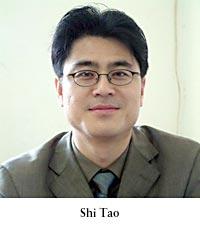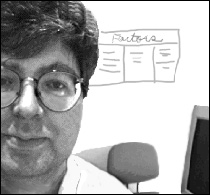The Yahoo dilemma
Also in today's blog
Lancet editors reject arms trade connection
Don't Make Me Think
Searching for John Frazee
Why this taste for anguish in novels?
Writers are born not made
For some years I've belonged to various private writers' forums hosted by Yahoo. On Thursday I read a newspaper report which made me wonder if I could continue exchanging news and views with far-flung colleagues in this easy way.
The report, by Richard Spencer who is China Correspondent for the UK broadsheet The Daily Telegraph, was headed "Yahoo 'helps China track down and jail dissident'"
Then I read the newspaper's second leader article headed "Web of complicity". This may also have been written by Mr Spencer.
Long ago, I interrupted my career as a newspaper reporter to spend two years in the north of Malaysia, then called Malaya. At first, living in the small town of Ipoh, I thought it might be possible to continue reporting. It wasn't, but the Chinese journalist I contacted, Leong Hew Meng, went out of his way to be friendly. Our acquaintance predisposed me to like all the Chinese people I met later. As far as individuals are concerned, I have never had cause to change that view.
So it was disturbing to read -
The mother of a journalist serving a 10-year prison sentence on charges of "illegally leaking state secrets abroad" is seeking a review of her son's court appeal. Gao Qinsheng, mother of imprisoned journalist Shi Tao, has alleged "serious procedural defects" in the proceeding, the human rights group Human Rights in China (HRIC) reported.

After reading the rest of this story at the CPJ [Committee to Protect Journalists] website, I spent a quarter of an hour searching Yahoo's site for an email address to which I could post my concerns about their part in Mr Shi's incarceration.
I found photos and biogs of the Yahoo management team, but the only way of contacting their PR department seems to be by telephoning a US number.
Next, I asked the opinion of colleagues on a Yahoo forum. So far, only three writers in a group of more than 70 have responded. This comment probably expresses the feelings of many. "I don't think a few women writing to Yahoo is going to change the way they do business. The Chinese market is so big that these huge corporations will bow the knee. And at a time when the UK is trying to persuade the European Parliament to give them access to mobile phone and internet records, I can't see the British Government wanting to stir the pot either."
Perhaps the writer is right. There's no point in fussing. Or is there?
Lancet editors reject arms trade connection
On Friday, the Book Trade News Digest included the following - "Lancet calls for publisher to cut ties with arms trade. Editors of the Lancet, one of the world's foremost medical journals, have demanded that its corporate owner stop promoting the international arms trade" with a link to an article in The Guardian newspaper.
"On behalf of our readers and contributors", the editorial says, "we respectfully ask Reed Elsevier to divest itself of all business interests that threaten human, and especially civilian, health and well-being". The editors say they "reject completely any perceived connection between the journal and the arms trade". They add: "One would expect the world's leading medical publisher to align its business values with the professional values of the majority of those it serves". The editorial continues: "Values of harm reduction and science-based decision-making are the core of public health practice". Military technologies at the biennial London arms fair were contrary to those values."
No doubt it will have shocked many people to learn that Reed Elsevier has an involvement with the arms trade.
At their site, I read
In February 2005, Reed Elsevier reported revenues for 2004 of just under £5bn/€7bn. Reed Elsevier's principal activities are in North America and Europe, and the company employs approximately 35,000 people in over 200 locations worldwide. Reed Elsevier's key objective is to become the indispensable partner to its target customers: scientists, lawyers, teachers and business professionals, for information-driven services and solutions…Operating in the science & medical, legal, education and business-to-business industry sectors, Reed Elsevier provides high value and flexible information solutions to professional end users, with increasing emphasis on the internet.
Whether the Lancet editors' protest will have any effect remains to be seen. I am still debating with myself whether to continue using Yahoo. I'll let you know my decision next Sunday. Meanwhile, if you have any views on this subject, do share them.
Don't Make Me Think
Yesterday morning a note from Steve Krug dropped into my Inbox. It included a link, not for general circulation, to a PDF file of one of the three new chapters for the second edition of his useful book [which I have on my bookshelves in Spain and often refer to] Don't Make Me Think.
Steve writes "Please note that this file is for your personal use only. No posting it, posting the URL, or emailing it to friends, please."
However I don't think he'll mind if I share a quotation he uses at the head of the chapter. It won't appeal to everybody, but clearly Steve likes it and so do I.
When a cat is dropped, it always lands on its feet, and when toast is dropped, it always lands with the buttered side facing down. I propose to strap buttered toast to the back of a cat; the two will hover, spinning, inches above the ground. With a giant buttered-cat array, a high-speed monorail could easily link New York with Chicago.
-john frazee, in the journal of irreproducible results
When I'd printed it out to show to my husband, who then told me some interesting things about monorails which had been told to him by a Spanish member of a mountain-walking club they both belong to, I set off on a quest.
But before I get to that, I must finish writing about Steve who is holding a workshop in London on October 7th which I'd love to attend but can't because I'll most likely be driving through France or unpacking and settling down for a hard-writing winter.

Steve, who describes his consulting firm, Advanced Common Sense as "just me and a few well-placed mirrors") is based in Chestnut Hill, Massachusetts, not far from Boston. He currently spends most of his time reviewing existing sites and designs for new sites, conducting usability workshops, and helping clients resolve thorny interface problems. Anyone with a website would do well to buy his book or, if strapped for cash, request a copy from their public library.
Searching for John Frazee
Delighted by the concept of a cat-and-buttered-toast monorail, I couldn't wait to find out more about its inventor, John Frazee. I haven't tracked him down yet, but I have found The Journal of Irreproducible Results founded by virologist Alexander Kohn and physicist Harry J. Lipkin in 1955 in Ness Ziona, Israel. The current editor is astronomer Norman Sperling who took over last year. He has subscribed to JIR since the 1970s and was previously assistant editor of Sky & Telescope magazine, and Science Editor of AltaVista.com. He teaches astronomy in universities around San Francisco, wrote What Your Astronomy Textbook Won't Tell You, and co-designed Edmund Scientific's Astroscan telescope.
The magazine has been described as "the funniest thing to happen to science since Archimedes ran naked through the streets of Syracuse." I noticed that there's only one woman, Connie Sancetta whose field is marine geology, on the 15-strong editorial board.
Why this taste for anguish in novels?
On August 7, I wrote about Jodi Picoult, "I wasn't planning to read her novels, but now that I've seen her face I shall give them a whirl." This week a postcard from the Guille-Allès public library told me that a copy of Picoult's 2004 title My Sister's Keeper was awaiting collection.
The shoutline above the title is "If you use one of your children to save the life of another are you being a good mother or a very bad one." In the acknowledgments at the front of the book, Picoult writes "As the mother of a child who had ten surgeries in three years, I would like to thank first the doctors and nurses who routinely take the hardest moment a family can experience and soften the edges…"
The novel is about Anna who, we read on the back cover, "is not sick, but she might as well be. By age thirteen, she has undergone countless surgeries, transfusions, and injections to help her sister, Kate, fight leukaemia." On page 18, Anna tells a lawyer she wants to sue her parents for the rights to her own body.
My Sister's Keeper was highly praised by reviewers but, as I read it, I wondered why, after people have read all the bad news in their newspapers and watched more bad news on television, they should want to read novels in which the characters worry and suffer.
This thirst for anguish seems to be something new. I don't remember the middlebrow novels read in my twenties and thirties being full of unrelenting mental and physical anguish. Nancy Mitford was funny. Mary Renault took one into the far past. Mary Stewart took her readers to interesting locations.
Writers are born not made
Twice in the Mary Stewart interview, she emphasises that writers are born not made.
MS: No. I've written stories since I was three and a half, and I think you're either born with the storyteller's flair or you're not. You can learn much about the craft of writing, but you either have the storyteller's flair or you don't. It's no virtue of mine. It's just there. In a story, however, each point of rest is also a point of departure; you can't help it.
MS: Well, actually this is, if I may say so, the storyteller's skill that one is either born with or one isn't. I remember someone writing to me about my very first book, the thriller Madam, Will You Talk?. She told me that she'd taken it up to read in bed. Then at three in the morning, she wrote me a complaint. I'd come to a point in the book where I'd actually brought my exhausted heroine and her hero together, and they'd had an absolutely smashing meal, which I described in detail. She said, I had to go down to the kitchen and make myself bacon and eggs. So, I thought, well, that's a tribute, anyway.
How I wish more of the people who tutor "creative writing" courses, or write how-to books about writing, would realise that Mary Stewart is right. I have never met a first class storyteller who didn't start early in childhood.
If you wish to respond to any part of today's blog, you can hit the comment button or email medirect.
